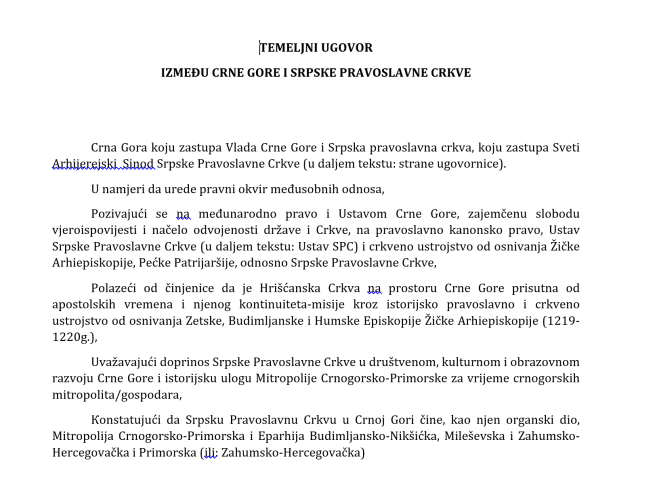
JUSTICE ELUSIVE AFTER 30 YEARS FOR KLAPUH FAMILY
06/07/2022
27 YEARS SINCE THE SREBRENICA GENOCIDE
11/07/2022Harmonize the Agreement between Montenegro and the Serbian Orthodox Church with positive law and the civil character of the state

Human Rights Action (HRA) yesterday sent a letter to the Prime Minister, Mr. Dritan Abazović, the Minister of Justice, Mr. Marko Kovač, and the Minister of Human and Minority Rights, Mr. Fatmir Gjeka, pointing the need to further harmonize the text of “The Basic Agreement between Montenegro and the Serbian Orthodox Church” with positive law, especially with regard to the extraterritorial status of the facilities of the religious community, to specify some provisions and terminologically align them with the Law on Freedom of Religion or Beliefs and the Legal Status of Religious Communities, i.e. the civil – secular character of the state, which is represented by the Government.
The letter indicated that the Agreement should:
- be called the “Agreement of Montenegro and the Serbian Orthodox Church”, in accordance with the Law on Freedom of Religion and the Legal Status of Religious Communities;
- avoid that the state refers to canon law which is not binding on Montenegro;
- specify which “public law powers” the state allows the Serbian Orthodox Church (SOC) to exercise;
- explain the specificity of the “obligation of the state to register all unregistered facilities of the SOC”, because this is otherwise a prescribed obligation of the competent state authorities in relation to all real estate owners;
- not agreed that security measures “cannot be taken in facilities owned by the Serbian Orthodox Church without the prior approval of the competent church authorities” because this is against positive law;
- make the religious terminology similar to the secular one used in the Law on Freedom of Religion and the Legal Status of Religious Communities and to omit from the preamble the provision on the “Christian Church”, which is not a contracting party.
It was established that the Agreement does not fully state the provisions prescribed by other laws, so this can also lead to legal uncertainty.
Bearing in mind that the conclusion of the Agreement in this form could lead to the procedure for evaluating its constitutionality, and unnecessary social and political tensions, we believe that it would be reasonable to further improve the text.
During the analysis, the HRA took into account contracts concluded by the Government of Montenegro with other religious communities, as well as the contract concluded by the Republic of Croatia in 2002 with the Serbian Orthodox Church.
During the analysis, the HRA took into account contracts concluded by the Government of Montenegro with other religious communities, as well as the contract concluded by the Republic of Croatia in 2002 with the Serbian Orthodox Church.







 English
English